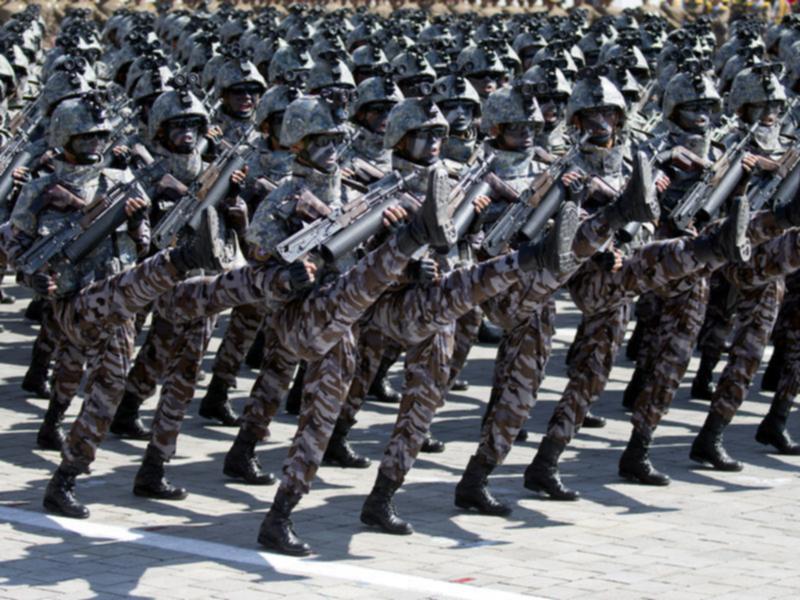JAMES STAVRIDIS: The North Korean troop deal exposes Vladimir Putin’s weakness
JAMES STAVRIDIS: At least 10,000 Korean foot soldiers are headed to the battlefields of Ukraine to fight and die in a cause that must be utterly bewildering for them.
Vladimir Putin is suffering grievous manpower losses as a result of his illegal and immoral invasion of Ukraine. He has lost around 200,000 killed, double that number wounded, and at least 500,000 young men fleeing the Russian Federation to avoid the draft: a butcher’s bill of over a million.
As a result, he is turning to international sources of additional manpower — Chechens, Cubans, and, most recently and dramatically, North Koreans.
At least 10,000 Korean foot soldiers are headed to the battlefields of Ukraine to fight and die in a cause that must be utterly bewildering for them.
Sign up to The Nightly's newsletters.
Get the first look at the digital newspaper, curated daily stories and breaking headlines delivered to your inbox.
By continuing you agree to our Terms and Privacy Policy.They will be strangers in a strange land indeed, and you can bet Kim Jung Un is holding their families hostage to prevent desertion. Many North Korean soldiers will die and some will desert despite the consequences, but their military impact will likely be insignificant.
In exchange, Kim will probably receive new advanced technology: better satellites, more precise ballistic missile guidance systems, nuclear weapons advice and more refined cyber tools. This will threaten South Korea — which is objecting vociferously. Of course, the US agrees with that assessment and will condemn both Russia and North Korea.
But we should understand that this transaction is clearly an indication of Russian weakness, not strength. Putin has been essentially forced to solicit a bargain with his fellow dictator in the isolated Hermit Kingdom. What does it mean for global geopolitics?
Stepping back from the tactical impact, which will become clear as the winter unfolds, there is a larger strategic point to be made about Russia’s declining place in the international world. As John McCain said a decade ago, “Russia is a gas station masquerading as a country.” Meaning its economy is a one-trick pony, or perhaps a two-trick pony if you count oil and gas.
Russia is now expending over 30% of gross domestic product on military spending (hardly an investment in a diversified economy); it’s under major sanctions from nations representing over half of the world’s GDP and has around $300 billion in assets frozen in western banks, which will likely end up reconstructing Ukraine. With a major brain drain as the smart young males and their partners flee the draft, it has a demographic problem of the first order as the population continues to age and decline.
And despite Putin’s apparent iron grip on power, consider this: A hundred years ago, another Russian autocrat thought he had an iron grip on power — control of the diplomatic corps, all branches of the military, the secret service, the elites of the nobility, everything that mattered. That was Nicholas II, the last czar. He and his family were executed in a dirty basement in the Urals.
Just a summer ago, Yevgeny Prigozhin, leader of the feared and powerful Wagner Group and former Putin chef, staged a rebellion that led his forces to the outskirts of Moscow before it became clear that the Russian Air Force wouldn’t support him. He was ultimately executed by a “mysterious” explosion of his private jet between Moscow and St Petersburg. The lesson of his rebellion is clear: While Putin appears to have control, the forces of opposition — on both the liberal and conservative fronts — are always on a slow boil. Such is Russia.
For the West, the real concern, of course, is a nuclear arsenal of roughly 5,600 warheads. During the turbulent period following the fall of the Berlin Wall, there were serious worries about the centrifugal forces pulling apart the Russian Federation — the core of the old Union of Soviet Socialist Republics.

The best course of action for the west should include remaining deeply mindful of Putin’s nuclear arsenal. It should also include concern about where those weapons end up in a chaotic endgame following a messy regime change in Moscow. That means we need to be doing a deep dive on prospective replacements for the current czar, requiring good signals and human intelligence as close as we can get to the court of Putin. Our ability to track nuclear weapons in the case of Russian chaos is important – something we developed at the end of the Cold War but has atrophied now.
It also means strengthening the NATO alliance, which collectively remains the best bulwark to further Russian decline and chaos. Ensuring that Ukraine has a path to full NATO membership, probably with a “halfway house” of strong security guarantees is important in the face of potential Russian collapse. All of this, of course, will be dependent on the next occupant of the White House. If Team Trump takes power, their well-known skepticism over NATO and affinity for Putin will make this more difficult.
All of this is deeply unsettling and full of bad choices. Is it better to see Russia collapse and Putin be overthrown but with a chaotic landscape and loose nukes? Or to see Putin remain in control to continue to threaten Ukraine, Georgia, Moldova, Estonia, and other European countries?
No good answers, but it clearly makes sense to prepare for the full spectrum of outcomes, especially as we watch Russia flail in Ukraine and recruit North Koreans for their fight. Not a good sign of a stable regime, to say the least. We should be prepared for a wide range of endgames, including a rapid collapse of a rotten regime in Moscow.
- - -
This column does not necessarily reflect the opinion of the editorial board or Bloomberg LP and its owners.
James Stavridis is a Bloomberg Opinion columnist, a retired US Navy admiral, former supreme allied commander of NATO, and dean emeritus of the Fletcher School of Law and Diplomacy at Tufts University.
More stories like this are available on bloomberg.com/opinion
©2024 Bloomberg L.P.
Bloomberg Opinion
